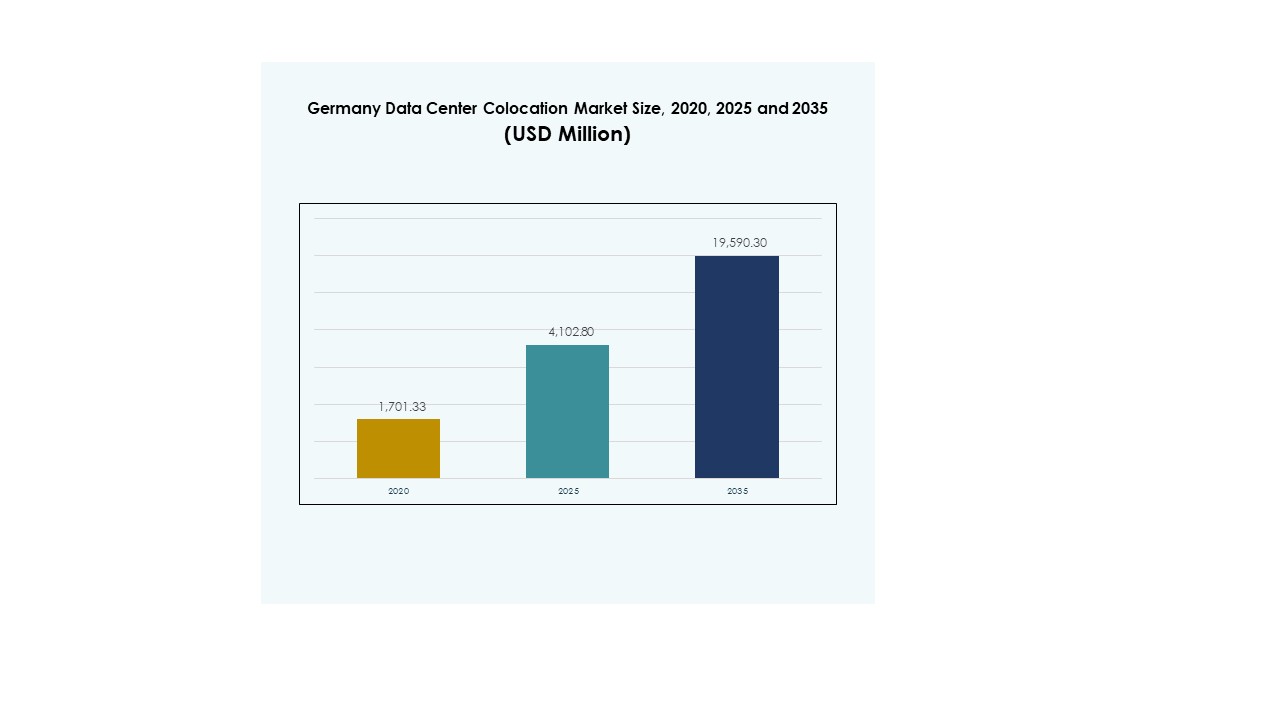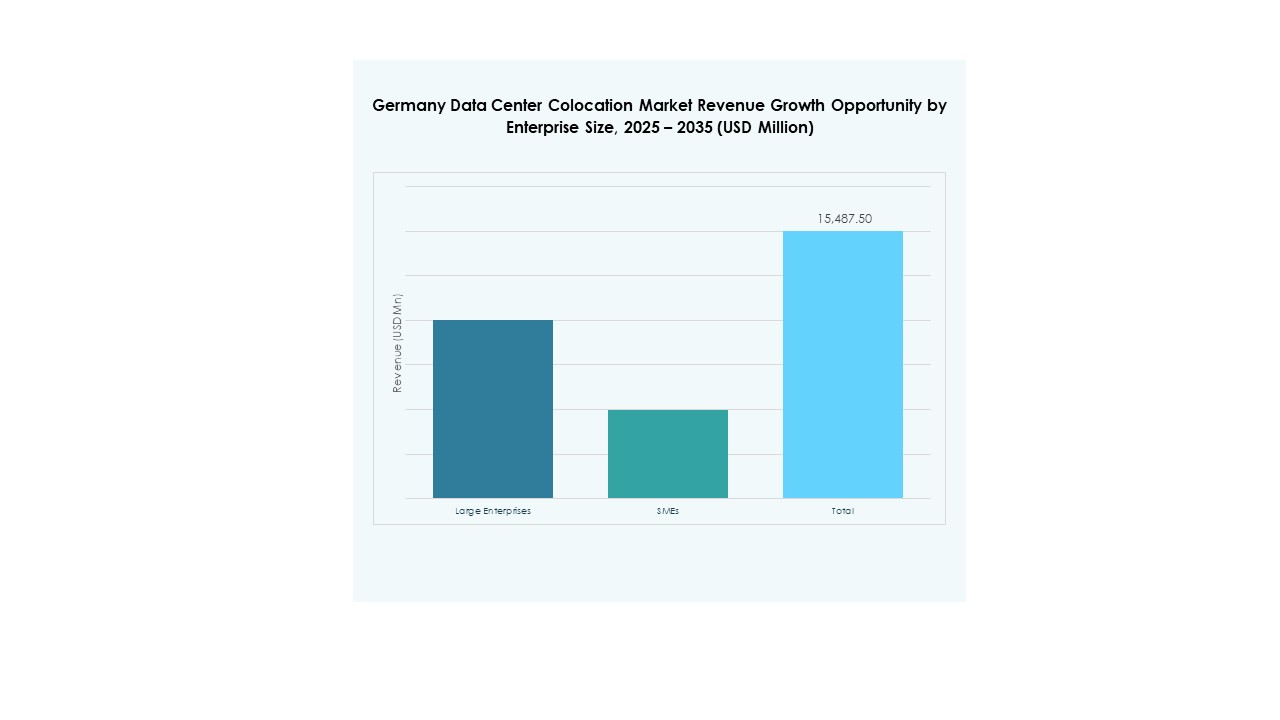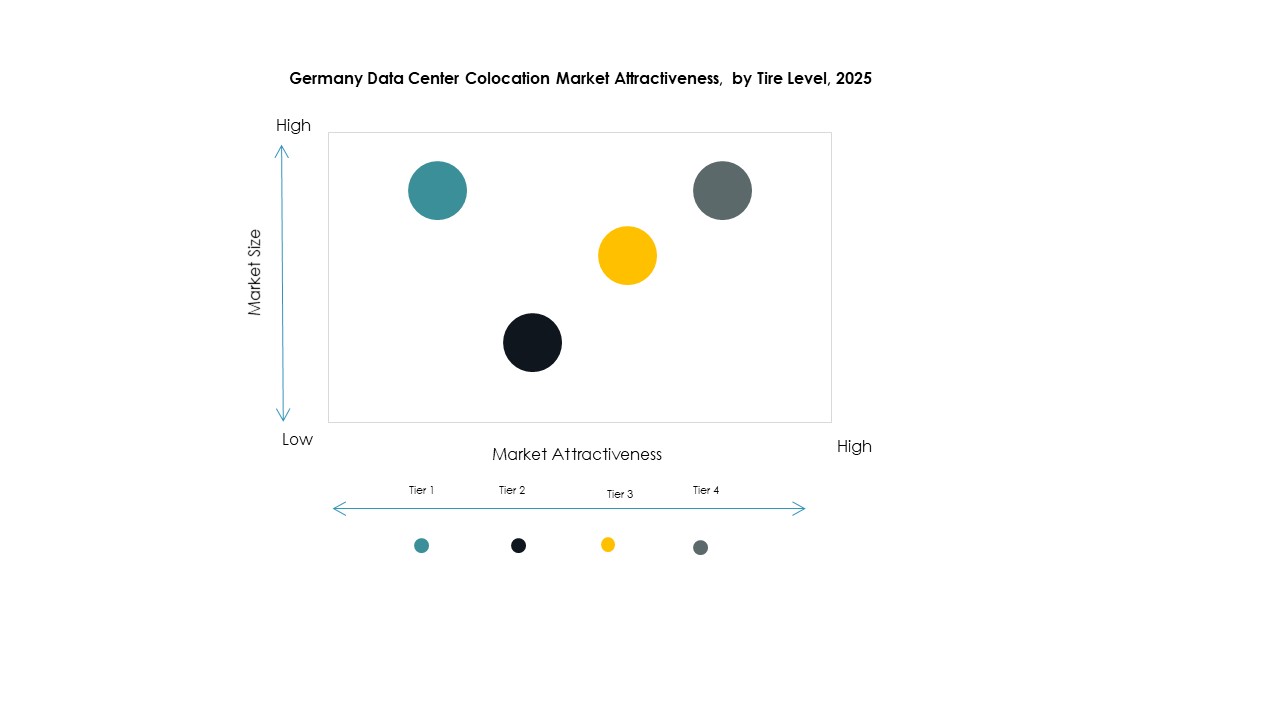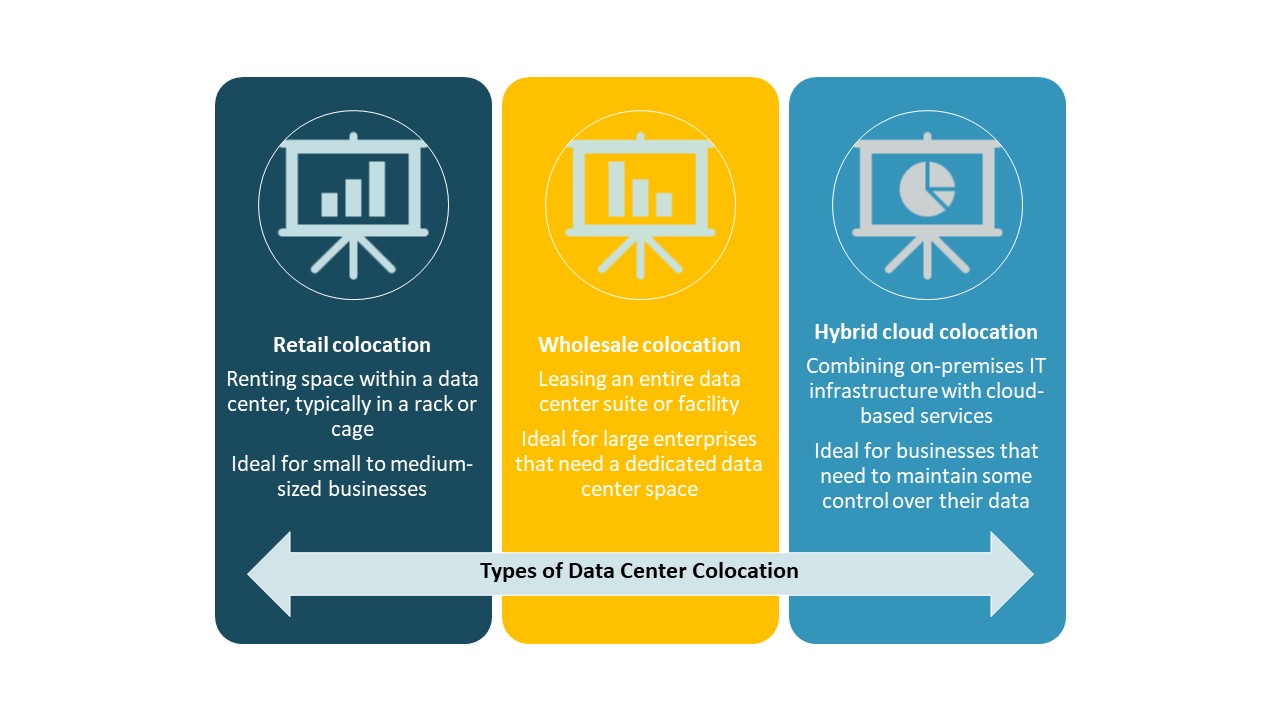Executive summary:
The Indonesia Data Center Market size was valued at USD 4,750.56 million in 2020 to USD 8,235.66 million in 2025 and is anticipated to reach USD 24,359.40 million by 2035, at a CAGR of 11.38% during the forecast period.
| REPORT ATTRIBUTE |
DETAILS |
| Historical Period |
2020-2023 |
| Base Year |
2024 |
| Forecast Period |
2025-2035 |
| Indonesia Data Center Market Size 2025 |
USD 8,235.66 Million |
| Indonesia Data Center Market, CAGR |
11.38% |
| Indonesia Data Center Market Size 2035 |
USD 24,359.40 Million |
Strong growth in cloud adoption, AI integration, and 5G expansion drives the market forward. Enterprises seek reliable digital infrastructure to manage rising data volumes and ensure operational efficiency. Innovation in modular and edge deployments supports demand in underserved regions. Data localization policies and smart city projects enhance opportunities for providers. The market holds strategic importance as it supports financial services, e-commerce, and telecom sectors. Investors consider it an attractive hub for Southeast Asia’s digital transformation.
Jakarta leads the market as the primary hub, holding the highest share due to its connectivity and economic dominance. Surabaya is emerging with investments in modular and colocation facilities, supported by growing enterprise demand. Batam benefits from cross-border connectivity and subsea cable infrastructure, making it a rising hotspot. Secondary cities also attract attention through smart city initiatives and SME adoption. This regional expansion supports balanced growth across the Indonesia Data Center Market.
 Market Drivers
Market Drivers
Growing Need For Digital Transformation And Cloud Service Expansion
The Indonesia Data Center Market is expanding due to strong demand for digital transformation initiatives. Enterprises are shifting workloads to cloud platforms to improve efficiency and scalability. Cloud adoption drives investments in hyperscale and colocation facilities across urban hubs. Digital-first strategies by businesses strengthen demand for reliable infrastructure. Edge computing adoption complements cloud strategies, reducing latency and enabling faster data delivery. Strong growth in e-commerce, fintech, and digital banking further accelerates the need for capacity. Investors view the market as critical to Southeast Asia’s digital ecosystem. It continues to position itself as a regional hub.
Technology Innovation Through 5G, IoT, And Artificial Intelligence Integration
Rapid adoption of 5G, IoT, and AI strengthens the digital infrastructure demand across Indonesia. Enterprises require advanced computing capacity to handle real-time data workloads. Integration of AI-powered cooling and monitoring systems enhances energy efficiency. Telecom providers and cloud operators collaborate to establish next-generation facilities. IoT adoption in logistics, healthcare, and manufacturing fuels edge data center growth. Businesses rely on 5G-enabled data centers for high-speed connectivity and real-time operations. These technological shifts attract both domestic and international investors. It creates a sustainable growth trajectory for the Indonesia Data Center Market.
- For instance, Indosat Ooredoo Hutchison, partnering with Huawei, launched Indonesia’s first AI Experience Centre at Solo Technopark in August 2024, backed by a $200 million investment and 5G-powered digital infrastructure, advancing technical training and digital innovation for thousands of professionals.
Government Initiatives And Data Localization Requirements
National policies emphasizing data sovereignty influence demand for local data storage facilities. Regulations mandate sensitive data to remain within Indonesian borders. This legal framework encourages investment in new regional centers by global cloud providers. Local enterprises benefit from reduced compliance risks and improved data security. Government-backed smart city projects drive adoption of modern data infrastructure. Supportive incentives encourage foreign investors to establish domestic facilities. This environment fosters competition among key providers. It reinforces long-term confidence in the Indonesia Data Center Market.
Strategic Importance For Enterprises, Investors, And Regional Connectivity
The market holds strategic importance for businesses and global investors targeting Southeast Asia. Enterprises view Indonesia as a central node for regional connectivity. Robust subsea cable investments enhance international data flow capacity. Strong partnerships between telecoms, IT firms, and cloud leaders expand growth opportunities. Digital banking penetration and e-commerce growth stimulate further infrastructure demand. Enterprises gain cost efficiency and resilience through colocation models. Investors benefit from stable revenue streams and expanding digital adoption. It continues to play a pivotal role in regional competitiveness.
- For instance, the Echo subsea cable developed by Google, Meta, and XL Axiata connects California, Jakarta, Singapore, and Guam with a design capacity of 144 Tbps, and is scheduled to be ready for service in 2025, directly strengthening Indonesia’s role in Southeast Asia’s data connectivity ecosystem.

Market Trends
Expansion Of Renewable Energy-Powered Data Centers
Sustainability trends dominate investments in the Indonesia Data Center Market. Operators focus on renewable energy integration to reduce carbon emissions. Solar, hydro, and wind energy projects support green infrastructure commitments. Power Usage Effectiveness (PUE) optimization becomes a critical performance metric. Enterprises demand sustainable hosting aligned with ESG mandates. Energy efficiency also drives competitive differentiation for colocation and hyperscale providers. Adoption of advanced cooling solutions reduces operational costs. It places Indonesia in a favorable position for sustainable digital infrastructure.
Rising Adoption Of Modular And Edge Data Center Deployments
Demand for low-latency services drives adoption of edge and modular centers. Enterprises leverage edge facilities to support IoT, AR, and real-time applications. Modular centers allow faster deployment in underserved regions. Scalability and cost-efficiency strengthen their adoption among SMEs. 5G network expansion accelerates localized infrastructure demand. Integration with smart city projects further boosts deployment. Cloud service providers adopt modular designs for regional expansion. It improves service accessibility in remote and emerging regions of Indonesia Data Center Market.
Increasing Focus On Cybersecurity And Compliance Standards
Rising digitalization increases the focus on data protection frameworks. Providers implement zero-trust models to strengthen security. Compliance with global certifications becomes a critical investment priority. Enterprises demand enhanced encryption, threat detection, and monitoring systems. Cybersecurity adoption expands due to the surge in sensitive data workloads. Data localization laws further heighten security commitments. Partnerships with global IT security firms support infrastructure trustworthiness. It makes security a core differentiator in Indonesia Data Center Market.
Growth Of AI-Driven Operations And Automation Integration
Automation adoption transforms facility management and operational performance. AI tools optimize energy usage and predict maintenance requirements. Automation reduces downtime risk and ensures operational continuity. Remote monitoring adoption supports hybrid and cloud workloads. Enterprises demand predictive analytics to enhance IT efficiency. AI-based scheduling reduces delays in infrastructure scaling. Smart automation boosts workforce efficiency and cost reduction. It reshapes operational excellence within Indonesia Data Center Market.
Market Challenges
High Infrastructure Costs And Power Supply Limitations
The Indonesia Data Center Market faces challenges from high capital expenditure needs. Building modern facilities requires significant investments in power, cooling, and security. Operational costs increase due to high electricity rates in urban hubs. Power supply reliability remains a major concern across expanding regions. Limited renewable energy availability restricts sustainable growth in certain areas. Providers need large-scale financing to manage infrastructure demands. Rising construction costs and import duties on equipment add pressure. It continues to test the financial resilience of providers.
Talent Shortages And Regulatory Complexities In The Market
A shortage of skilled professionals impacts the industry’s capacity to scale operations. Enterprises struggle to find talent with expertise in cloud, AI, and cybersecurity. Training and education programs are insufficient to meet demand. Complex regulatory frameworks create additional entry barriers for foreign investors. Data localization laws require constant compliance monitoring. Inconsistent infrastructure development across provinces slows expansion. Cybersecurity threats further complicate compliance requirements. It adds to operational risks in the Indonesia Data Center Market.

Market Opportunities
Rapid Cloud Service Adoption And Digital Economy Expansion
The Indonesia Data Center Market presents strong opportunities from cloud adoption and digital economy growth. Enterprises across e-commerce, fintech, and healthcare drive demand for scalable facilities. Startups require affordable colocation and modular solutions to support operations. Global providers expand local footprints to serve fast-growing demand. Rising adoption of SaaS and PaaS models further accelerates opportunities. Data-driven businesses seek AI and analytics-ready infrastructure. Hybrid solutions emerge as attractive models for enterprises. It continues to provide significant investment prospects for investors.
Regional Connectivity And International Investor Expansion
Regional connectivity projects such as new subsea cable systems strengthen opportunities. These investments expand international data flow and support global enterprise operations. Indonesia becomes a preferred hub for multinational corporations in Southeast Asia. Investors target long-term revenue opportunities in both hyperscale and edge markets. Local partnerships enhance entry strategies for global providers. Expansion into secondary cities offers new customer bases. Strong government support creates a favorable investment climate. It unlocks sustained growth in Indonesia Data Center Market.
Market Segmentation
By Component
Hardware dominates the Indonesia Data Center Market with servers, storage, and cooling infrastructure driving growth. Rising data workloads push enterprises to invest in advanced racks and networking systems. Strong demand for efficient power management and security systems fuels hardware segment adoption. Software also gains traction with orchestration and automation tools improving operational efficiency. Services expand through consulting, managed services, and integration support. Providers offer end-to-end services to ensure facility resilience. It reinforces hardware as the leading segment with growing support from software and services.
By Data Center Type
Hyperscale data centers dominate due to rising cloud adoption and large-scale enterprise demand. Global providers build hyperscale campuses to support AI and big data workloads. Colocation also holds strong demand from SMEs and regional enterprises. Edge and modular facilities grow rapidly in underserved regions for low-latency needs. Cloud and internet data centers expand with SaaS and platform adoption. Enterprise data centers remain relevant for private storage and compliance requirements. Mega centers enhance international connectivity capacity. It positions hyperscale as the central growth driver.
By Deployment Model
Cloud-based deployment leads the Indonesia Data Center Market due to rapid SaaS and hybrid adoption. Enterprises favor cloud-based models for scalability and cost savings. On-premises solutions still attract organizations with strict compliance requirements. Hybrid deployments gain strong adoption for balancing security and flexibility. SMEs increasingly shift to cloud hosting due to low entry barriers. Large enterprises invest in hybrid to manage mission-critical workloads. Government institutions also accelerate hybrid adoption for sensitive applications. It makes cloud-based models the fastest-growing segment.
By Enterprise Size
Large enterprises dominate with strong demand for colocation and hyperscale capacity. Their adoption of AI, 5G, and analytics requires advanced infrastructure. SMEs show rising demand for modular and cloud-based solutions. Affordable pricing models encourage SME participation in the digital economy. Managed services and scalable packages cater to their needs. Large enterprises maintain leading share with international connectivity demand. SMEs contribute to long-term market diversification. It strengthens both enterprise size segments in Indonesia Data Center Market.
By Application / Use Case
IT and telecom lead adoption due to strong connectivity and digital service demand. BFSI also holds significant share with digital banking and fintech growth. Retail and e-commerce expand usage through online transaction and logistics platforms. Healthcare adoption rises with telemedicine and patient data requirements. Government and defense rely on secure facilities for national data handling. Media and entertainment strengthen demand from streaming and gaming services. Manufacturing and education also adopt AI-enabled infrastructure. It diversifies applications across Indonesia Data Center Market.
By End User Industry
Cloud service providers dominate as they expand hyperscale campuses across the country. Enterprises invest heavily in colocation and hybrid facilities. Government agencies establish data centers for secure storage and compliance. Colocation providers strengthen presence through affordable models for SMEs. Other industries such as education and energy utilities adopt specialized facilities. Cloud services remain the strongest driver of infrastructure investments. Demand from enterprises ensures balanced growth across categories. It positions cloud service providers as the dominant force in Indonesia Data Center Market.

Regional Insights
Jakarta As The Core Hub With Highest Market Share
Jakarta dominates the Indonesia Data Center Market with over 60% market share. The city serves as the economic and connectivity hub for enterprises. Strong demand from BFSI, telecom, and cloud service providers drives capacity expansion. Robust power infrastructure supports hyperscale and colocation developments. Jakarta attracts the majority of foreign direct investments in digital infrastructure. Subsea cable projects further strengthen its role in international data flow. It continues to serve as the central growth hub for the industry.
- For instance, in June 2024, NTT commenced construction of the Jakarta 2 Annex Data Center (JKT2A), its third facility in the city, delivering 12 megawatts of IT load across 5,800 square meters to support the growing demand from BFSI, telecom, and hyperscale cloud sectors. NTT’s JKT3 campus in the Bekasi area, opened in April 2022, also offers an initial capacity of 15.2 MW and expands Jakarta’s position as the data center capital of Indonesia.
Emerging Growth From Surabaya And Batam Regions
Surabaya holds 20% share with rising investments in modular and colocation facilities. Its strategic location in Eastern Indonesia enhances digital access for regional enterprises. Strong government-backed infrastructure projects accelerate adoption. Batam captures 10% share due to its role as a cross-border connectivity hub. The region benefits from proximity to Singapore and subsea cable landing stations. Enterprises view Batam as an affordable alternative for expansion. It strengthens Indonesia Data Center Market’s resilience outside Jakarta.
Opportunities Across Secondary Cities And Outer Regions
Secondary cities and outer regions account for 10% of the market. Growth is driven by SMEs, e-commerce firms, and smart city projects. Edge and modular centers enable localized infrastructure expansion. Improved connectivity ensures access for remote and underserved areas. These regions present new opportunities for investors targeting regional penetration. Decentralization reduces reliance on Jakarta while enhancing nationwide resilience. It positions the Indonesia Data Center Market for balanced regional growth.
- For instance, the Indonesian Ministry of Investment and Downstreaming confirmed in May 2025 that Batam’s data center expansion is part of a broader national strategy to attract digital infrastructure investment in regional hubs.
Competitive Insights:
- Telkomsigma
- Biznet Data Centers
- DCI Indonesia
- Indonet
- MyRepublic Indonesia
- NTT Communications Corporation
- Digital Realty Trust, Inc.
- Microsoft Corporation
- Amazon Web Services, Inc. (AWS)
- Google LLC (Alphabet Inc.)
The Indonesia Data Center Market features strong competition between domestic providers and global hyperscale operators. Local companies such as Telkomsigma, Biznet, and DCI Indonesia dominate with established infrastructure and regional expertise, catering to enterprise and government clients. Global leaders including AWS, Microsoft, and Google expand aggressively to capture cloud-driven demand, supported by significant investments in hyperscale campuses. NTT and Digital Realty strengthen their positions by offering colocation and interconnection services, while Indonet and MyRepublic focus on scalable solutions for SMEs. It remains highly competitive, with providers differentiating through sustainability initiatives, edge deployments, and advanced cloud integration, ensuring robust growth and long-term investor interest.
Recent Developments:
- In June 2025, Edgnex Data Centers by Damac, a leading digital infrastructure company, announced the land acquisition and early construction of its second AI-focused data center facility in Jakarta, Indonesia. The site, projected to deliver a future capacity of 144MW and backed by a $2.3 billion investment, will set new standards for AI-driven infrastructure and is expected to begin first phase operations by December 2026.
- In July 2025, DAMAC Digital secured a landmark land acquisition in Cikarang, West Java, with the help of JLL Indonesia, laying the foundation for one of the country’s largest future AI-focused data centers. Spanning 50,000 square meters and targeting a 144MW capacity, this $2.3 billion investment is anticipated to power Indonesia’s transformation into a strategic hub for next-generation digital infrastructure, with completion of the first phase expected by Q3 2026.
- In July 2025, Anaplan launched its new data center in Indonesia, aiming to provide local businesses with enhanced data management, advanced analytics, and improved compliance with local regulations. This launch allows Indonesian enterprises to access high-performance, scalable infrastructure, and benefit from reduced data latency, robust security, and seamless integration for financial and workforce planning activities.
 Market Drivers
Market Drivers

